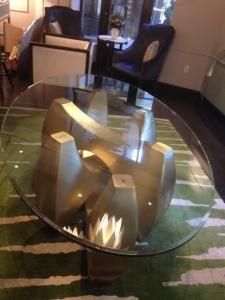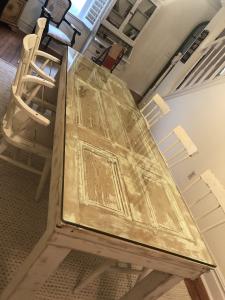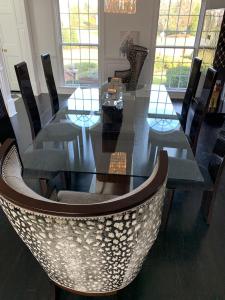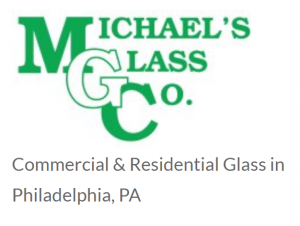How to Choose the Correct Thickness of Glass
Glass becomes part of the support framework where the thickness provides safety and strength. Glass must support not only its weight but objects placed on it.
PHILADELPHIA, PENNSYLVANIA, UNITED STATES, June 18, 2022 /EINPresswire.com/ -- The thickness of glass figures into the supporting framework where the glass pane's thickness provides safety and strength. A free span of glass must be strong enough to support not only its own weight but also whatever objects are placed on it
Glass table covers rest on another surface as a protective feature, such as a coffee table. However, tabletop glass is a suspended surface, with only the table's framework and pane thickness supporting the clear or colored glass. Trying to save money by selecting an inadequate thickness can lead to disaster.
A professional glassmaker artesian can assist you in determining the thickness of the glass piece required for any glass tabletop project. By getting the proper thickness consumers will avoid the potential for disaster including injury.
Glass Thickness
The thickness of tabletop glass is determined by the table base. For example, if you simply intend to use the glass as a protective cover on top of another tabletop, a quarter-inch thick glass should suffice. If the tabletop glass is to be used as the actual tabletop or table surface, it must be thicker glass.
In any case, if the table is larger than 24 inches in length or will be supporting heavy objects, the glass should be thicker than a quarter-inch. The most common thicknesses are 3/8′′, 1/2", and 1/4". The thicker the glass top, the more substantial it appears and feels. However, if the glass top is too thick for the size of the table, the weight can be an issue. As the size increases, thicker glass can increase the weight greatly.
The Various Thicknesses
Thinner glass, such as a 1/4′′ thickness, is usually sufficient for patio tables, inserts, smaller tables, or protective glass covers. The 1/4" glass thickness should be adequate for glass tabletops and protective covers. Thick glass with a 3/8′′ thickness is popular and durable for a heavy, unsupported table top where the glass will be the stand-alone table top. 1/2" thickness provides the protection and durability required for a strong, stand-alone tabletop.
Glass thickness is used as part of its supporting framework where the glass pane thickness provides safety and strength. A free span of glass must be strong enough to support not only its own weight but also whatever objects are placed on it.
Some glass table covers rest on another surface as a protective feature, such as a coffee table. However, many glass tabletops are suspended surfaces, with only the table's framework and pane thickness supporting the clear glass. Trying to save money by selecting an inadequate thickness can lead to disaster.
Here is a handy chart to be used for glass thickness sizing
Glass has common thicknesses and uses in the USA. Other countries that use the metric system for sizing use sizing that is directly applicable to US standards.
Common USA v Metric uses
– 1” thick = 25.4 mm – Generally used for tables, glass flooring, glass stair treads, and glass furniture
– 3/4” thick = 19.1 mm – large tabletops, large shelving, business fronts, countertops, and glass floors
– 1/2” thick = 12.7 mm – handrails, large shower doors, and enclosures, glass walls, room partitions, large shelves, tabletops, counters, conference rooms
– 3/8” thick = 9.5 mm – partitions, framed showers and enclosures, frameless shower doors and enclosures, tabletops, shelves, walls, and partitions
– 1/4” thick = 6.4 mm used for all general glass applications including framed shower doors. table top protective cover, indoor and outdoor lighting fixtures, shelves as a protective cover and as an insulating device
= 3/16″ thick = 4.8 mm – cabinet door panels, single-pane window, small mirrors.
= 1/8″ thick = 3.2 mm – smaller tabletops, small cabinet door panels, insulated units, picture frames
= 3/32″ thickness (2.4 mm) – used in picture frames, smaller insulated glass units, not tempered.
A professional glassmaker can assist you in determining the thickness of the glass piece required foranyglass tabletop project.
Table Top Made of Tempered Glass
Aside from the thickness of glass, which contributes to its strength, it is important to consider safety in the event that the unthinkable occurs and a glass tabletop breaks.
The worst-case scenario can be avoided by using tempered glass. Tempered glass is a safety glass. It has four times the strength of ordinary glass. If a pane of glass is broken, it will shatter into glass pebbles rather than dangerous, sharp shards. Tempered glass is used by automobile manufacturers for safety reasons, and it should be chosen by any homeowner for their glass tabletop project for the same reason.
Glass Forms
Table top glass is available in a variety of sizes and shapes, including round, square, and rectangular. You can choose colored or mirror glass table tops, tempered glass table tops, beveled glass, flat polished edges, and more. The best part is that having a separate glass table top allows you to be creative with the table base — a base that people will notice from every angle due to the clear glass top.
Base Types:
-Living room coffee table
-A kitchen dining table
-End table
-Desktop
-Side table
-Wooden table
-Patio table
Special Orders
A professional Glass Company can create a glass tabletop cover using the buyers’ specifications. Professionals take the exact specifications and thicknesses. A full-service glass company, offers clear glass, colored glass along with tabletops, mirrors, windows, doors, food preparation tables, and other products.
The folks at Michaels' Glass located in NE Philadelphia, are highly experienced skilled craftspeople who have the necessary experience, tools, and design ideas for all types of glass, including automobile commercial and residential projects. In addition to quality repairs and installation, the glassmaker professionals are experts at edge work, whether it's pencil polish, flat polish edge, beveled polish/beveled edges, or radius corners.
Contacting the glass experts at Michaels is easy. Call 215-338-3293 or email info@michaelsglassco.com or www.michaelsglassco.com
Bonnie Lipinski
Michael's Glass Co
+1 215-338-3293
bonnie@michaelsglassco.com
Visit us on social media:
Facebook
Twitter
LinkedIn
Other
Legal Disclaimer:
EIN Presswire provides this news content "as is" without warranty of any kind. We do not accept any responsibility or liability for the accuracy, content, images, videos, licenses, completeness, legality, or reliability of the information contained in this article. If you have any complaints or copyright issues related to this article, kindly contact the author above.




